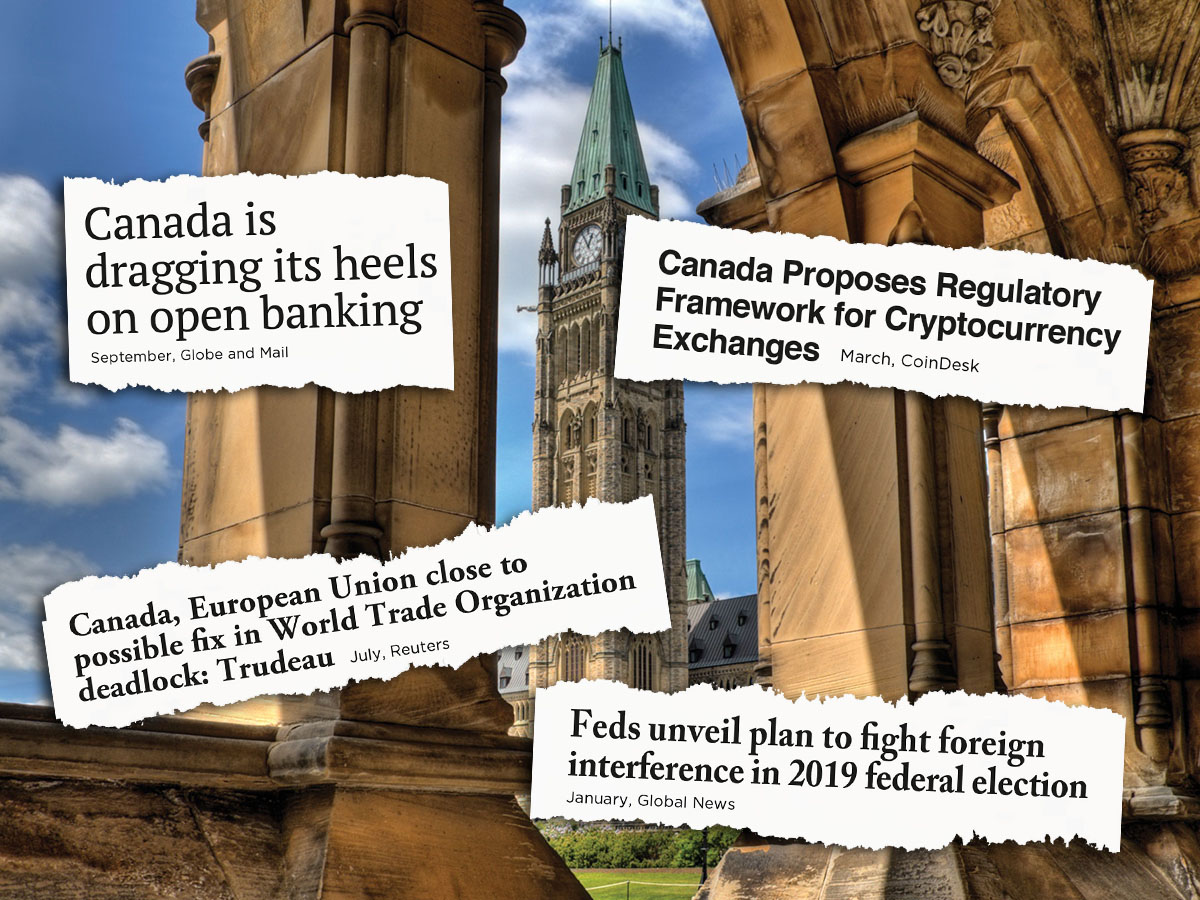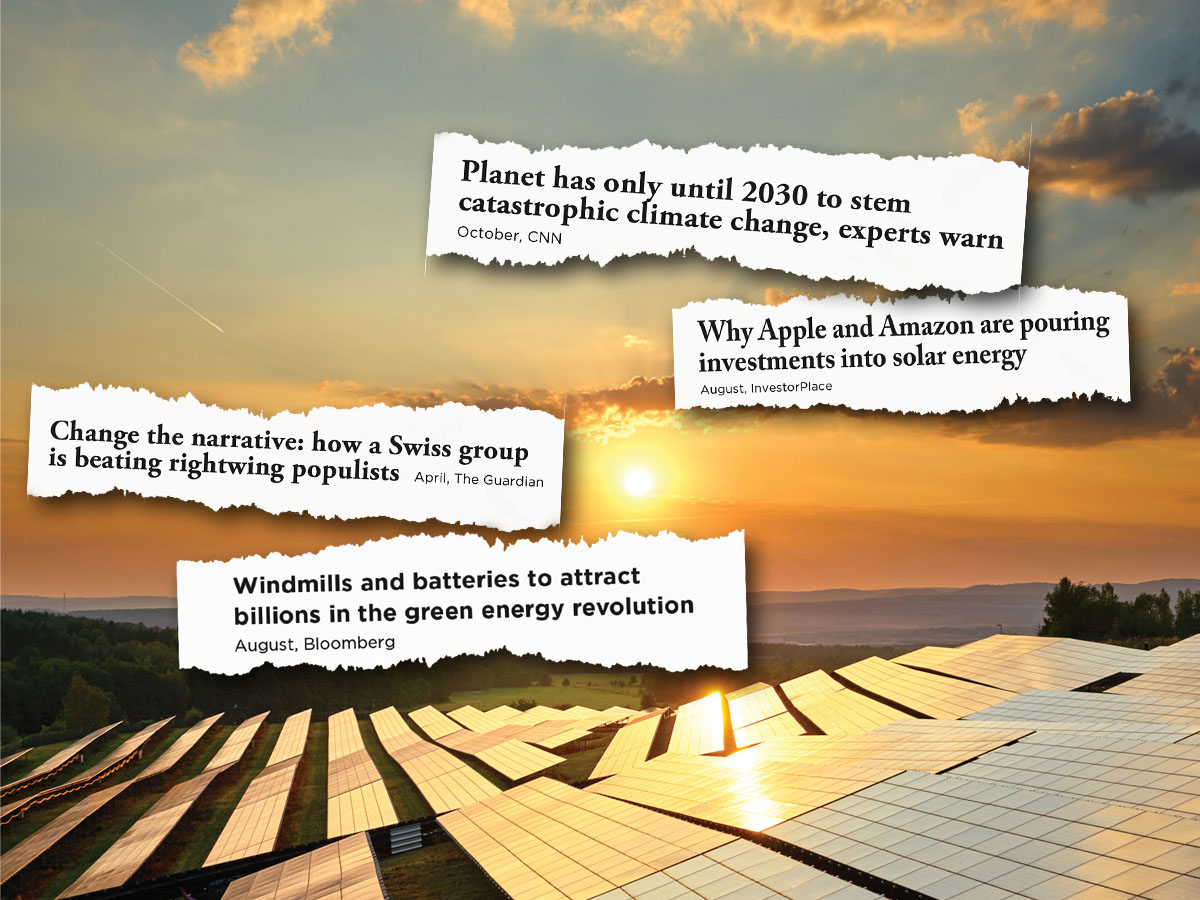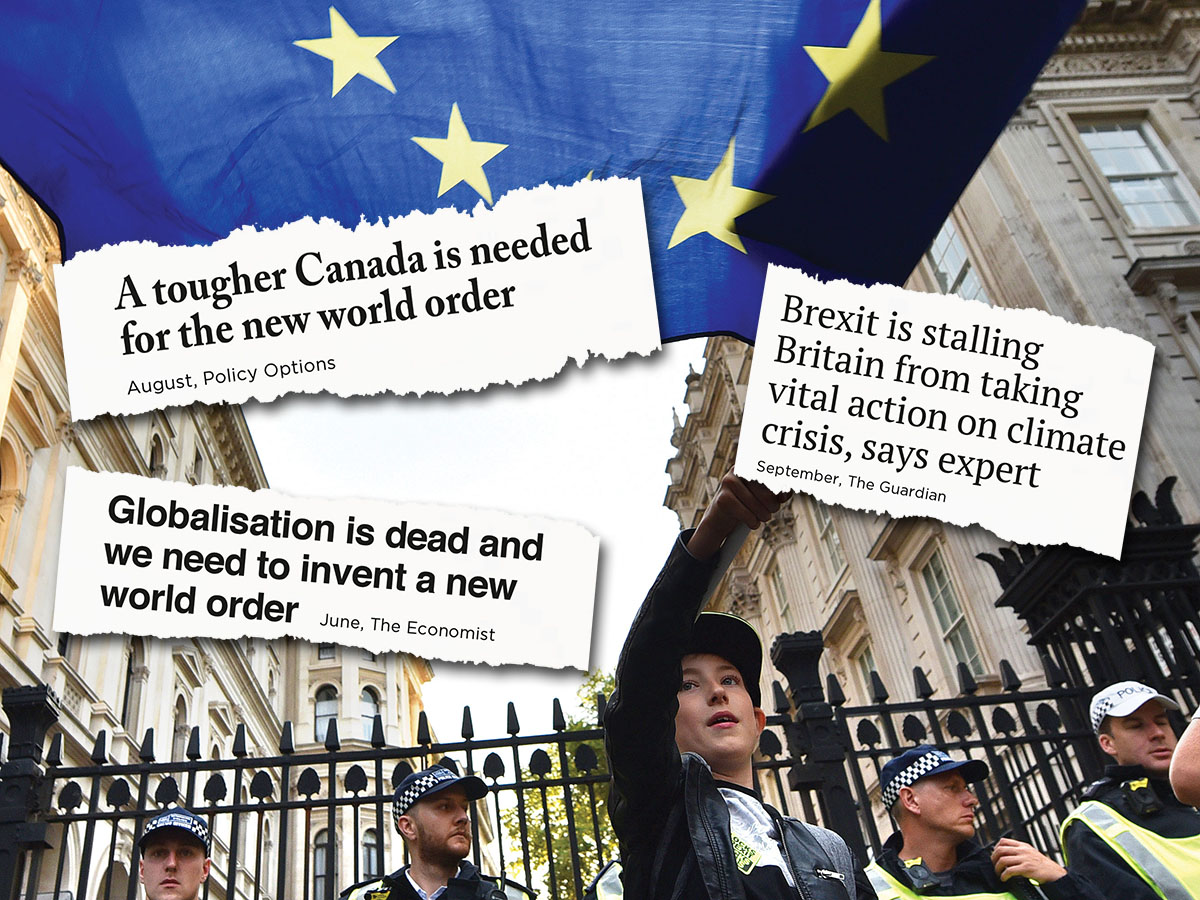
What will the accounting profession look like in 2030?
 As part of Foresight, more than 1,000 CPAs and business leaders weighed in on the scenarios online, imagining what each future might mean for them
As part of Foresight, more than 1,000 CPAs and business leaders weighed in on the scenarios online, imagining what each future might mean for them
One year ago, CPA Canada assembled a team of 40 business leaders and big thinkers from across the country for Foresight: Reimagining the Profession, a forum on the future of accounting. In a series of roundtable discussions, the participants—CPAs and non-CPAs from finance, industry, technology, government and academia—asked themselves: what will the profession look like in 2030 and beyond?
To answer that question, they had to ask a bigger one: what will the world be like in a decade or two? Their response took the form of four “scenarios,” disparate visions of the future. In some, the international community bands together; in others, it fractures apart. Some scenarios envision technological change as a force for good; others see it as a threat. “Of course, it’s impossible to predict the future,” says Tashia Batstone, CPA Canada’s senior vice-president of external relations and business development. The coming years are likely to contain elements of all the scenarios, rather than just one. “They’re not what we think or hope the future will be, but simply what’s plausible. The value of the scenarios is that they frame the discussion. They encourage CPAs to think differently and consider the challenges and opportunities that we may face in the future.”
As part of Foresight, more than 1,000 CPAs and business leaders weighed in on the scenarios online, imagining what each future might mean for them. If governments embrace strict environmental regulations, for example, what role can CPAs play to help businesses meet them? If tech titans set the global agenda, should CPAs become the keepers of Big Data? The goal: to ensure the profession remains relevant in all possible futures. “I’m impressed by how carefully and thoughtfully this profession is thinking through its future, given all the technological disruption coming their way,” says Rohinton Medhora, president of the Centre for International Governance Innovation, a Waterloo-based think tank. “This is a good process for all professional associations to pursue.”
In the following pages, we revisit the scenarios with the help of a team of futurists, taking into account a year of political dramas, trade wars and data breaches. No matter what happens, CPAs will have an opportunity to shape the coming years, says John Helliwell, professor emeritus at the University of British Columbia. “This requires resilience, adaptability and the capacity to make accounting standards and behaviour a force for increasing both trust and cooperation,” he says. CPAs will have to be “both nimble and nice—advisers who both create and inspire trust.”
THE PANEL
John Lukomnik, Managing partner of Sinclair Capital
Rohinton Medhora, president of the Centre for International Governance Innovation
Philip Hunter, principal of leadership and talent at Verity International
THE SCENARIOS
 Slow and Steady is a series series of careful steps into an uncertain future, rather than a leap of faith into the unknown (Getty)
Slow and Steady is a series series of careful steps into an uncertain future, rather than a leap of faith into the unknown (Getty)
1) SLOW AND STEADY
The scenario
The near- and mid-term future will be characterized by relative stability, social consensus and sustained trust in a range of institutions, from local organizations to global bodies. Both leaders and individuals will need to agree on inclusive, considered solutions to a range of major challenges, including climate change, data security and the unintended impact of emerging technologies. Yet this sluggish future will also be marked by slow growth, limited innovation and entrepreneurial frustration that could drive some economic activity underground. Global institutions will try to push climate mitigation solutions, but progress will be slow as countries miss reduction targets.
The verdict
Slow and Steady’s allure is right in its name: it’s a series of careful steps into an uncertain future, rather than a leap of faith into the unknown. Over the past year, many countries have adhered to such an approach, fining tech giants and regulating cryptocurrency. “This is what Canada will continue to try to do,” says Hunter. “But I don’t know if the rest of the world will allow it. We’re just beginning to go down the roller coaster of shifting to a radically different world.” Even if Canada hopes for the Slow and Steady scenario, says Lukomnik, it would be wise to prepare for a faster, more disruptive future. “This scenario is probably the one that people would like most,” he says. “But the real world doesn’t work that way. Ironically, it is the future most people plan for.”
 The catastrophes that act as a catalyst for Phoenix Rising may be unwelcome—“one hopes they don’t happen, clearly,” says John Lukomnik (iStock)
The catastrophes that act as a catalyst for Phoenix Rising may be unwelcome—“one hopes they don’t happen, clearly,” says John Lukomnik (iStock)
2) PHOENIX RISING
The scenario
A series of global calamities—extreme weather, financial collapse, devastating pandemics—forces the international community to work collaboratively toward a better future. Realizing that no one escaped the impact of these events, business, political and social-movement leaders advance an inclusive agenda that goes well beyond economic growth and aims instead to strengthen civil society. Broad objectives—like the United Nations’ Sustainable Development Goals, basic income, climate-change mitigation and accessible education—drive decision-making, and leaders marshal technology to advance these causes. While most people align themselves behind these shared ideas, a few bemoan the loss of individualism and unfettered markets.
The verdict
The catastrophes that act as a catalyst for Phoenix Rising may be unwelcome—“one hopes they don’t happen, clearly,” says Lukomnik—but most of the futurists agree that, given economic trends and the pace of climate change, they may be inevitable. “There’s a high possibility that major events in the next five to seven years will reshape the planet,” says Hunter. And, as Medhora adds, “We’re often forced into doing things by crises.” Where the experts diverge is how the world may react to these disasters. “I don’t think the response in the short to medium term will be, ‘We all have to work together,’ ” says Hunter, who envisions such events sowing discord, not international cooperation. Lukomnik is more optimistic: he says the scenario is an extension of developments such as GDPR, Europe’s data protection rules. “People welcome new behaviour, but they will have concerns about privacy,” he says. “And yet we all want more functionality in our pockets.”
 Rohinton Medhora argues that it’s counterproductive to frame the clash between governments and tech giants as an either-or battle. Both have a role in a vibrant future, he says. (Getty)
Rohinton Medhora argues that it’s counterproductive to frame the clash between governments and tech giants as an either-or battle. Both have a role in a vibrant future, he says. (Getty)
3) TECH TITANS
The scenario
Amid economic volatility, trade wars and anti-immigration sentiment, the world’s major political powers pursue wildly different goals, marking the demise of internationalism.
Global “tech titans”—Apple, Google, Facebook, et al.—dominate, defying minimal regulation and pushing radically transformative technologies. These companies consolidate their influence over health care, transportation and media through the control of data and the rapid deployment of artificial intelligence. Weak states fail to protect vulnerable jobs from AI, leaving a battered labour force of gig workers on short-term contracts. While technological progress yields life-improving breakthroughs, it also creates mass instability and inequality.
The verdict
The futurists contend that elements of both Phoenix Rising and Tech Titans will prove true. “It is a mistake to believe that we’ll have one of these scenarios be the dominant paradigm,” says Lukomnik. Escalating tensions are evident in calls—from people like presidential candidate Elizabeth Warren—to break up big tech firms. Medhora argues that it’s counterproductive to frame the clash between governments and tech giants as an either-or battle. Both have a role in a vibrant future, he says. “Whichever scenario you buy into, what’s central is the interplay between technology and society,” he says.
“To see it as some kind of battle royale between the two is not helpful.”
 Philip Hunter argues that My Way has already arrived, not just in obvious ways—Brexit, immigration clampdowns, isolationist government—but in the actions of regular people. (Getty)
Philip Hunter argues that My Way has already arrived, not just in obvious ways—Brexit, immigration clampdowns, isolationist government—but in the actions of regular people. (Getty)
4) MY WAY
The scenario
The near-term future is deeply fragmented and inward-looking, the result of mounting populism and a global breakdown in trade agreements, regulatory systems and financial institutions. As mistrust overwhelms domestic politics and international relations, many people retreat to the safety of their local communities. Even as evidence of climate change accelerates, the prevailing atmosphere militates against cooperation that might mitigate the crisis. With the economy sluggish, older Canadians delay retirement, causing record unemployment among young people who also have little incentive to pursue higher education. Universities and colleges respond with more apprenticeship programs and practical courses that serve expanding cottage industries. In this atmosphere of anemic growth, developing nations leapfrog ahead, finding innovative solutions to replace legacy services in domains like health care, education and infrastructure.
The verdict
Hunter argues that My Way has already arrived, not just in obvious ways—Brexit, immigration clampdowns, isolationist government—but in the actions of regular people. “In Canada and the United States, people are moving less frequently,” he says, adding that even shifting labour conditions haven’t resulted in significant relocations. “That indicates to me there’s less of a desire to uproot yourself and be bold and adventurous and more of an inclination to stay put. That’s one potential sign of a country and a society that’s turning inward.” The futurists caution that such an insular worldview may allow problems that require global cooperation, such as climate change and geopolitical tensions, to go unchecked or to fester, perhaps causing some of the calamities that kick off the Phoenix Rising scenario. “Just because societies turn inward,” he says, “doesn’t mean nations no longer need each other.”
Visit cpacanada.ca/en/foresight-initiative for the latest information on Foresight